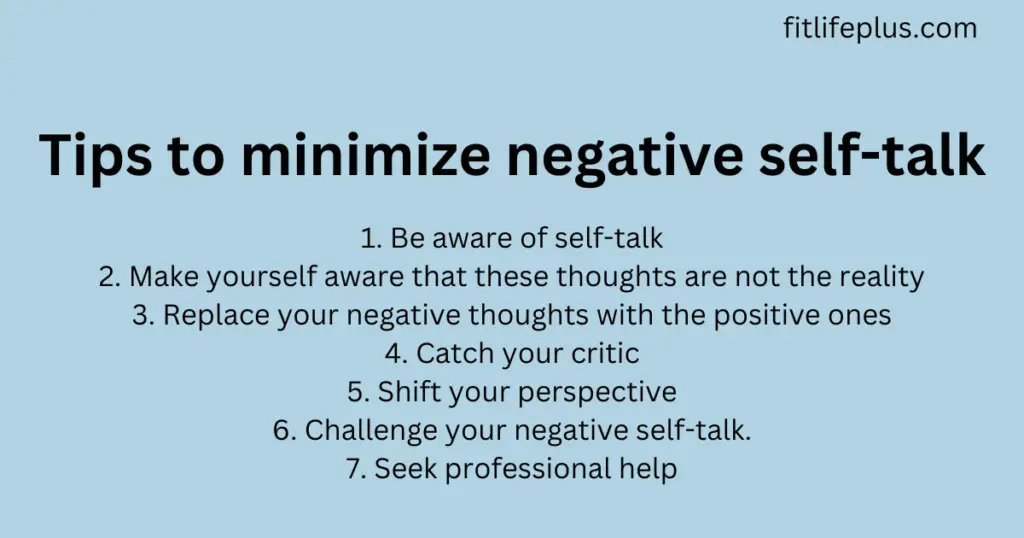We always have thoughts running around us all day, and what we say to ourselves profoundly impacts our mental health. The things we think or tell ourselves affect our beliefs, self-concept, and behavior.
When you continuously think negatively and focus on everything from an opposing point of view, you will feel depressed, resulting in anxiety. It will result in a pessimistic outlook, making you suffer from low self-esteem. This must-have gives you an idea of how unkind self-talk can impact your mental health and confidence.
Positive self-talk is very beneficial as it can enhance your performance and improve your relationship with others. You must know how unkind self-talk can impact your mental health to eliminate negative self-talk immediately. So, without any delay, let’s dig into the details.
What is negative self-talk?
Negative self-talk is when your inner thoughts become too negative and sound more like a critic. It sounds too hopeless, and you start believing you will fail the tasks even before starting. You will feel like you are good at nothing, have tried everything, or will not be able to do this.
You will continuously have these negative thoughts but know they don’t connect with reality. But if you let these thoughts affect your mental health, you might mess up things.
Consequences of negative self-talk
Negative self-talk can have a very damaging effect on our mental health. According to a large-scale study, negative self-talk can increase the risk of mental health problems. Focusing on negative self-talk can affect your motivation level and make you feel helpless and hopeless. It even led to depression, so it’s not something that you can ignore.
1. Anxiety and depression
Unkind self-talk is linked with depression and anxiety. Constant degrading yourself can have a worse impact, leading to depression and even making it difficult to find the motivation to achieve something.
2. Low self-esteem
When we constantly degrade ourselves, it will take a toll on our self-esteem. It makes us doubt our abilities and worth, making us feel inadequate and worthless. Low self-esteem affects our lives, including professional growth and personal relationships.
3. Perfectionism
Negative self-talk makes you believe that great isn’t as good as the perfect and it’s impossible to attain perfection. It makes the mere high achievers do much better than perfectionists as they don’t take that much stress and are happy when they give their best. Such people are so glad because they don’t try to put their efforts to zero by thinking it could have been better.
4. Relationship difficulties
When you are constantly self-criticizing yourself, you will become needy and insecure. Your negative self-talk will start reflecting into other negative general habits. Lack of communication and the harmful impact of negative self-talk will also affect your relationships with your partner and family.
5. Limited thinking
The more you thought you wouldn’t be able to do it, believe me, you won’t do it. Negative self-talk will lower your ability to see opportunities and make you unable to capitalize on them. The sense of stress comes from your perception and the change in your behavior that comes with it.
Tips to minimize negative self-talk

How do I minimize the negative self-talk? Fortunately, there are many ways to reduce the negative self-talk. Different strategies work for different people. Some methods work for one person, while some work better for others. You must follow the tips to know which one is effective for you.
1. Be aware of self-talk
First, you must be aware of what you say to yourself. When you realize you are being too critical, take note of it. Write down your thoughts and observe which situation makes you engage in such behavior.
2. Make yourself aware that these thoughts are not the reality
Thinking negatively about yourself is just your observation or opinions regarding a situation. Your ideas can not be accurate as you are just being critical of yourself. Your thoughts can be as wrong as others as you can be under the influence of the situation and become indispensable.
3. Replace your negative thoughts with the positive ones
Once you have challenged your negative thoughts, you must replace them with something positive. For example, instead of telling yourself you are incapable, tell yourself how capable you are. Instead of calling yourself ugly, tell yourself how beautiful you look. Doing so will improve yourself, whether about work or family relations.
4. Catch your critic
Start noticing when you are becoming self-critic to make yourself stop. For example, you can see that by observing what you say to yourself, but you wouldn’t dare to say it to your friends or family.
5. Shift your perspective
Sometimes, looking at things for too long makes you realize that you are unnecessarily thinking about things that deep. For example, ask yourself if something will matter still after 5 or 10 years.
Another ideal way of shifting perspective is taking the world as a globe and yourself as the tiny person living on it. You will realize that it doesn’t matter that much. It will eliminate your negativity, urgency, and fear of negative self-talk.
6. Challenge your negative self-talk.
How can unkind self-talk impact your mental health? Once you know your harmful self-talk habit, you can start challenging it. Ask yourself if the things you are telling yourself are true. Are you stupid or ugly or just being critical of yourself?
7. Seek professional help
Talking to a professional might be better if you cannot eliminate this harmful self-talk habit. Seeking help from a professional therapist will let you know the main reason behind these negative thoughts. They will let you know how to eliminate this unhealthy self-talk habit.
If you are struggling with the harmful self-talk habit, don’t hesitate to ask for help. Remember that you deserve to be treated with respect and kindness, even by yourself.
FAQ’s
How can negative self-talk affect a person?
Though there is a group of people who will say that negative self-talk will make you try harder and do better, research says the opposite. Evidence proves that being too critical of yourself will result in stress, anxiety, and depression. It will also impact your daily life: cognitive processes, relationships, academics, and creativity.
Can negative self-talk result in depression?
Negative self-talk can make the already existing anxiety and depression worse. When you are going through the mental hardships, the last thing you want to have is the constant criticism.
How does positive self-talk benefit?
Positive self-talk benefits seeing the whole situation, not just the negative aspects. By using more positive self-talk, you will see your confidence boosting and getting more control over a situation. You will see yourself achieving your goals.
How to deal with the negative self-talk?
You can deal with negative self-talk by following a simple rule: never say anything harsh to yourself that you wouldn’t know to others. Be gentle to yourself and encourage yourself in every situation. If a negative thought enters your mind, reply with a positive one. Think about the things you are thankful for in your life.
Conclusion
I hope this article has answered “how unkind self-talk can impact your mental health.” By recognizing its negative impacts and promoting positive talk and self-composition, you can save yourself and prosper in a healthy and beautiful relationship with yourself.
Remember that you are unique and best in your way, and like others, you deserve love, kindness, and respect.





